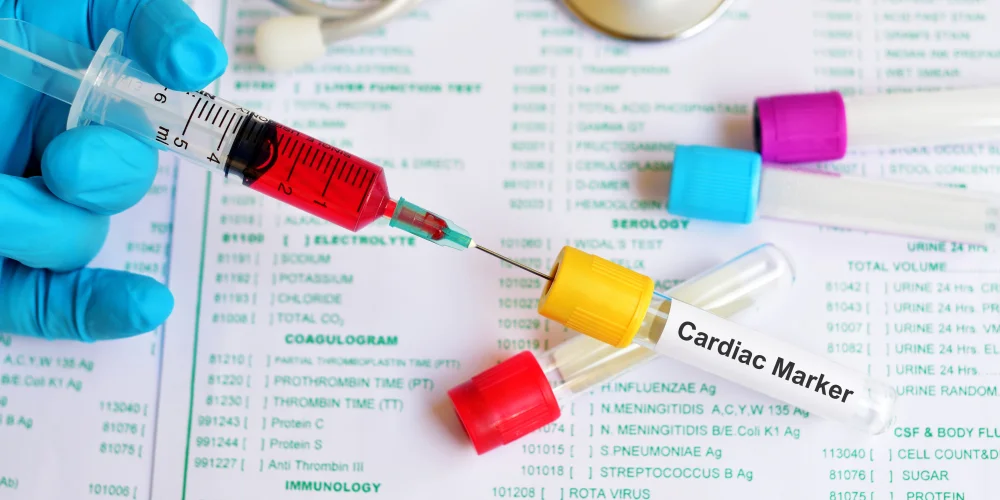Cardiac Marker 4 Test
Assessment for Heart Disease and Myocardial Injury
It is the Cardiac Marker Test is a crucial diagnostic test that measures the level of certain substances that are released into circulation of the blood when the muscle in your heart is injured or under stress. These substances, such as troponins, creatine-kinase-MB (CK-MB) and myoglobin are important indicators of heart injuries. The elevated levels of these markers aid in identifying the onset of myocardial damage (heart attack) and assessing the severity of damage to the heart. Through the analysis of these markers, medical professionals can assess the severity of heart conditions as well as guide treatment strategies and track recovery. This test is crucial to ensure timely and precise management of heart-related conditions, assuring an appropriate medical intervention as well as improving the outcomes of patients.

When is the Cardiac Marker 4 Test Prescribed?
This Cardiac Marker Test is commonly used in a variety of clinical situations:
- Acute Myocardial Infarction Acute Myocardial Infarction : To identify the presence of a heart attack, by detecting elevated levels specific markers of the heart.
- Chest Pain Evaluation : For patients who complain of chest pain, to determine if it is due to heart issues.
- Monitoring Heart Conditions : To keep track of patients suffering from heart diseases or those receiving therapy for heart diseases.
- Pre-Operative Evaluation : To determine the health of your heart prior to undergoing major procedures or surgery.
Preparation for the Cardiac Marker 4 Test
The process of preparing to take preparation for the Cardiac Marker Test is generally simple. Fasting is not mandatory to pass this test. However, it is essential to inform your doctor regarding any medication you’re taking, since certain medications may affect the results of the test. In addition, if you’re suffering from symptoms such as chest discomfort or breathlessness Be sure to notify your doctor to ensure it can ensure that your test is scheduled in a way that is appropriate
Parameters Considered During Cardiac Marker 4 Test
A Cardiac Marker Test typically measures the presence of several important parameters in order to determine the health of the heart. Troponin-1 (TROP I) is a crucial marker; the presence of elevated levels indicates damage to the heart muscle and are vital for diagnosing myocardial ischemia. Creatine Kinase-MB (CK-MB) is an enzyme that is released when heart muscles are damaged, which helps determine the severity of damage to the heart. Myoglobin is an amino acid that is found in blood whenever muscle tissue which includes the heart, has been damaged. In addition the BNP (B-Type Natriuretic Peptide) levels are measured. High levels could indicate heart failure, or other cardiac ailments. Together, these measurements give a complete picture of the health of your heart and assist in identifying and treating heart-related conditions.
Time Required for Cardiac Marker 4 Test Report
It is the Cardiac Marker Test is a fairly quick diagnostic test. The blood samples are collected rapidly generally within a matter of minutes. The analysis of these samples can be done in a matter of hours, though the exact duration may differ according to the lab’s workload and the particular markers that are being examined. The speed of turnaround is vital to ensure timely diagnosis and treatment of heart-related conditions, allowing quick medical intervention as well as improving the outcomes of patients.
Cardiac Marker 4 Test Price
In Chirayu Super Speciality Hospital, the Cardiac Marker Test is priced at Rs.3550. This test is comprehensive and provides a precise assessment of the heart’s health and is vital to diagnose and manage cardiac issues effectively.
Booking an Appointment for Cardiac Marker 4 Test
What Our Patients Say
Hear from our valued patients about their experiences at Chirayu Super Speciality Hospital and how our care has made a positive impact on their health and well-being.


The test provided essential insights into my heart health. Highly recommend the service.


Great service and clear explanations about my cardiac health from the staff.


Very satisfied with the comprehensive care and accurate results from Chirayu Hospital.


The quick turnaround time was crucial for my heart condition diagnosis.


Efficient and professional staff made the process smooth and stress-free.


Quick and reliable service for my Cardiac Marker Test. The results were available promptly.
Frequently Asked Questions
Here, we provide answers to some of the most commonly asked questions to help you better understand our services, policies, and facilities. If you have any additional questions, please do not hesitate to contact us.
Elevated levels of cardiac markers typically indicate heart muscle damage or stress, such as that caused by a heart attack.
No special preparation is required. Inform your healthcare provider about any medications or symptoms you are experiencing.
Results are usually available within a few hours. Rapid testing is critical for timely diagnosis and treatment.
While it is highly effective for diagnosing myocardial infarction and assessing heart damage, it may need to be combined with other tests for comprehensive evaluation.
Discuss abnormal results with your healthcare provider to determine the appropriate next steps for treatment or further evaluation.